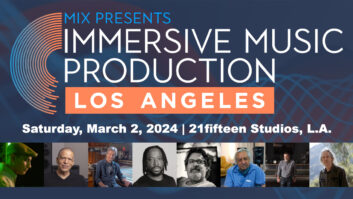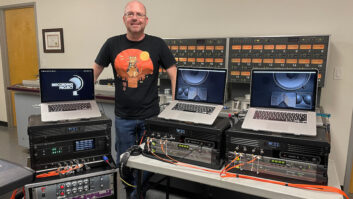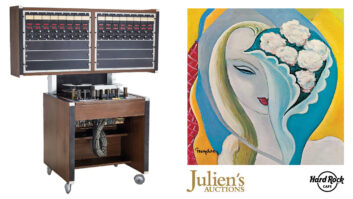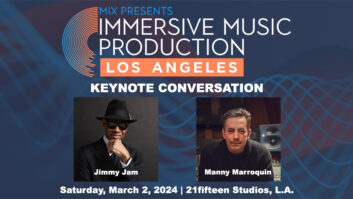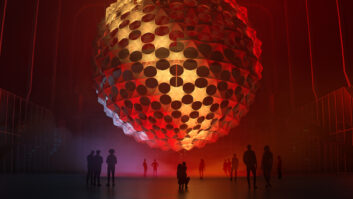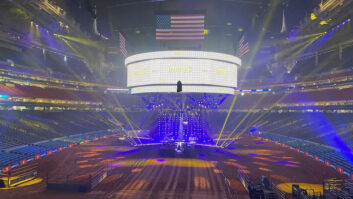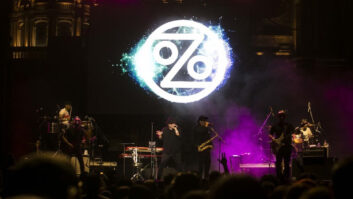Eric “Roscoe” Ambel is regarded by many fans of Americana and roots-influenced rock music to be one of the most inspirational and sensitive producers working. Albums he’s made with the Bottle Rockets, Blood Oranges, Blue Mountain, The Backsliders, Whiskeytown, Nils Lofgren, Mojo Nixon, Syd Straw, The Yayhoos and others, do a good job of capturing the heart of the music, without sanding out any of the reckless sparks. Ambel fundamentally trusts the essential chemistry of what constitutes each ensemble, and it shows in his work.
With a rockin’ background that includes a stint as a guitarist in Joan Jett’s band, as well as a leadership role in the Del Lords, Ambel knows a few things about what makes a good rock band tick. At the time of this interview, Ambel was in Nashville with his engineer Tim Hatfield, picking up a console for 33 & 11/43 Recording, his home-base studio in Brooklyn, New York City. He was also getting ready to begin work on a side solo project called Gringoman.
What drew you into producing?
I got hooked by music very early on. My dad always listened to a lot of Sousa marches at home. As a real little kid, my Dad took me to a parade in our hometown of Batavia, Illinois. While I was standing on the sidewalk, I heard the whole band coming down the hill, playing the song. As they walked by me, I got to hear each individual instrument, almost like soloing on a tape machine, and as they left and got further away, it all became the whole song again. I swear it was an epiphany or understanding that happened to me right then. It related immediately to the piano, like each instrument being a different finger. I have always loved music a lot, and that was my first really big hook.
That epiphany just gave me the “view.” And when I started playing with rock bands, it was great to know a bunch of this stuff. Even in the awkward years, like in the punk rock era, when it wasn’t very cool to have chops, it helped to have the backbone.
Producing, at its simplest level, could be as Lou Whitney explained it: “Find somebody who has done this before, and have them help you do it.” [Laughs.] So when I was seeing these local bands in this after-hours bar in New York City called No Se No, I just realized, “I’ve done this before, and I know I could help these guys do this.” That is when I started doing a bunch of 45s for this truck-driving label out of Brooklyn called Diesel Only. They did mostly truck-driving songs. That was during the ’80s, during the Del Lords period.
That was your breakthrough production?
The Nils Lofgren Crooked Line album on Rykodisc was a very exciting breakthrough for me. Nils is one of the best musicians I have ever encountered. He can play anything and is capable of executing any idea that we wanted to try.
Which of your productions are you proudest of?
This new Bottle Rockets Brand New Year record was quite a process to get done. I have so much respect for them as a band and hanging with me, and hanging with themselves. They have a real inner strength as a band. They have really stuck with me as a producer.
Mary Lee’s Corvette, True Lovers of Adventure, has a lot of ensemble elegance. [Ambel also played guitar in this band with Freedy Johnston.] And the Blue Mountain record is another one I like. I think Blue Mountain are a really great band, and I had a great time working with them. I think the Dog Days record stands up really well. I would love to work with them again.
Blood Oranges are a great band. To me, they were like a roots-rock Fleetwood Mac, and I think that Fleetwood Mac is a good band. My first solo record, Roscoe’s Gang, is another one I really enjoy. I still like it when I hear it blasting out of the jukebox at the Lakeside Lounge.
Speaking of your latest Bottle Rockets production, they are very good at digging deep into a groove and not overplaying.
One of my favorite sounds is that turned-up, but taking-it-easy kind of sound. On the Bottle Rockets record, their free-association song called “Sometimes Found” has that. They’re an electric band, but everybody is playing the “Sweet Spot” thing, and they aren’t kicking the shit out of it.
Brian Henneman [the lead singer] is singing on that Manley Reference Cardioid Microphone. When we did the recording at 33 & 11/43 in Brooklyn, we had that Manley microphone running into a V76, into an 1176, to grab the peaks, and then the Manley ELOP to compress that.
When we were making this Bottle Rockets record, those guys had just discovered Shania Twain. When we made this record, we never sat around and listened to The Band’s second album, or [the Stones’] Exile on Main Street, or Little Feat’s second record, Sailin’ Shoes. We never listened to our “comfort” records. We were listening to Shania.
Those guys were also watching all the videos. They would cut to Shania in the studio, and there she is singing on that Manley Cardioid Reference Microphone. It was just so inspirational for Brian to know that he was singing through the same mic as Shania. I’m not kidding at all. I’m glad I bought that mic. It is a great-sounding mic, and my wife sounded great on it, too. [Laughs.]
Who are your most influential producers?
I would have to say the guys that I have learned the most from and like the sound of their stuff are Brendan O’Brien, Jim Dickinson and Lou Whitney.
As a Midwestern guy, I like my steak medium rare, cooked on a Weber grill, with a little bit of salt and ground pepper on it. I don’t want any sauce on my steak. I like records that are elemental like that. In that sense, the Brendan records to me are pretty unadorned like that.
The Replacements record that Dickinson did stands alone, to me, as the great Replacements album. I like the peaks and valleys of albums, and that one has got them. It is the right combination of many elements at the same time.
It’s pretty obvious that you gravitate towards rock that is unfiltered in its emotional immediacy and unpretentious in presentation. Is there a defining experience that comes to mind, that helped crystallize your tastes?
It was the summer of 1976, and I had just come home to Chicago for the summer from the University of Wyoming, where I played trumpet all the way through college in marching band and taught skiing for the University. This was right when punk rock started.
I was working as a waiter, and I won these tickets from this great radio station in Chicago called WXRT, to see these two bands I had never heard of-The Ramones and The Dictators. [Laughs.] It was at the Ivanhoe Theater, and both bands were really impressive.
During The Ramones, there was a woman sitting two seats away from me masturbating. I got up and starting walking around the theater, and I saw other women doing this in public. I counted seven.
At the time, being a young guy in bands playing guitar, the cool thing was Jeff Beck’s Blow by Blow and the whole quasi-jazz thing.
And you were into that?
I wasn’t exactly into that, but it seemed that you “had to” be into that.
But when I saw these two bands playing this real rock ‘n’ roll that was so primal that it could get a woman to masturbate in public, I signed up right then and there. The Ramones’ jackhammer attack and what I saw was the most rock ‘n’ roll thing I had ever seen.
I found out years later, when I was touring with Joan Jett, that there was actually this group of girls who called themselves the Candle Club, who went around and did this sort of thing.
Before I saw The Ramones, I had never seen a band that played their own music in a place that wouldn’t hold a football team. So this was a whole different world and that pretty much opened up the whole thing for me.
So I went back to school in Laramie, Wyoming, and started the punk rock band called the Dirty Dogs. We became The Accelerators when we moved to L.A. We literally showed up in Hollywood on Halloween night and ditched our car on Hollywood Boulevard and jumped into the whole thing. That was 1978.
We were in L.A., when it really was the heyday with X and The Germs. I was at the first Go-Go’s gig ever. We had a practice space in The Masque, which was this rehearsal space underneath the Pussycat theater over on Hollywood Boulevard. That was like the center of the real punk rock thing in L.A.
By 1979, our band had broken up, and I was already playing with some other people, this guy, Rik L. Rik and this other guy named Top Jimmy, who was this great rockin’ blues dude. Top Jimmy & the Rhythm Pigs.
Around this time, you hooked up with Joan Jett.
There was an ad in the paper that said, “Joan Jett is looking for three good men.” So I answered the ad. I had one time smoked a Sherman with her and Darby Crash [of The Germs] outside a club. [Laughs.] One hundred and forty guys went for this audition, and I went first. After about forty guys, they called me back and said that I was in the band. So I started Joan Jett & the Blackhearts with Joan. I was in her band from 1979 through 1981. I was involved in the recording of the I Love Rock ‘n’ Roll record, and then we parted ways.
I have got to say that I have the utmost respect for Joan Jett. The whole time I ever played with her, her rock ‘n’ roll clock was unbudgeable. I think that people still have only heard the tip of the iceberg of her talent.
When I was the guitar player, I was like the band leader, and eight years after I was out of the band, they were still recording covers that I taught the band. We did a great version of “Rebel Rebel.”
And “Crimson and Clover.”
On “Crimson And Clover,” I had already been with her in the studio a couple of times. The producer and her manager, Kenny Laguna, would never let me overdub or fix anything. I really wanted to do something cool on the solo. When it got to the solo, I literally kind of jerked-off on the neck, sliding my hands up and down the neck, so it would obviously need to be fixed. Like, “This is where the guitar solo goes.”
At the time, the record company was Boardwalk Records. Neil Bogart, the guy who once had Casablanca Records, was the head of Boardwalk. He loved the whole thing, so they just mixed the record with that jerking off on there, and it became this big hit record, with this jerk-off guitar solo!
So what did that teach you about producing?
I don’t know. [Laughs.] Back then, there were two producers: Kenny Laguna was really kind of this business guy, and he had been the keyboard player in a later version of Tommy James & the Shondells [who originally recorded “Crimson and Clover”]. But this other little guy, Ritchie Cordell, was the guy who actually wrote “I Think We’re Alone Now” and “Mony Mony” for Tommy James. He was like the “real” guy.
So, with the Tommy James alumni working behind her, Joan Jett’s bubblegum punk was arrived at honestly.
Yeah. It was perfect.
“I Love Rock ‘n’ Roll” is one of all-time classic rock anthems.
That song was the theme of a British TV show that didn’t last very long. Steve Jones and Paul Cook of the Sex Pistols found that song for her. Those guys made the first recording of it as a 45 that came out in Holland on Ariola Holland. After they brought it to Joan, we went out and played “I Love Rock ‘n’ Roll” for two years before we recorded it. The wild part of it was, every night and everywhere we went, that song “won” every time.
Every big rock producer of the day came to Joan and Kenny and tried to get the record. They wanted to produce that record.
That song was so unstoppable that, to a degree, it didn’t exactly take a rocket scientist to make a hit out of it.
That’s what Kenny knew. Joan’s thing has always been what I would call elemental. It’s just the elements. It isn’t any of the alloys. So all Kenny had to do was just get out of the way and let it happen, and that’s what he did.
I’ve been in music stores, where I could hear all the way across the room some guy starting to play that riff. It’s just one of those songs.
So after Joan Jett, when did the Del Lords come along?
Joan had brought me to New York, and I realized I could get done in a day what took a week to do in Los Angeles. So I was digging New York, and I found the Del Lords, who weren’t the Del Lords yet. But they were practicing, and I heard about them, and by the next day, I was in the band. The first song we played was “Folsom Prison Blues,” and we took it from there.
So that was a departure from what you were playing in LA.
Yes, but to me, it really wasn’t that much of a departure, because it was elemental rock ‘n’ roll guitar music. We were listening to Johnny Cash and The Stooges and found the common ground in both of them.
We had four albums and a live record. Now there is a CD called Get Tough that is out currently on Restless, which is a “best of the Del Lords.” It has some pretty cool stuff, but I will say that it was during the “Dark Years” of guitar recording.
How do you mean that?
Our whole tenure as a band was in the ’80s, when people were infatuated with the advent of digital reverb and MIDI. We would go to studios where guys hadn’t put a mic on an amplifier for a while. All they were doing was MIDI and transferring stuff from synthesizers onto 2-inch tape. The only thing harder than recording an electric guitar at that time was recording a clean electric guitar.
So are those Del Lords records listenable for you now?
It is kind of hard for me. Over and over, people have come up to me and said how great digital is and “digital will do everything.” Well if it can go into my ’80s records and extract the horrible digital reverb that was put all over them, then I’m ready to sign up. [Laughs.]
It gets to be one of those things, like when you were in high school and some guy from an insurance company comes in and says things like, “Statistically, in your lifetime, you will have spent 23 months sitting on a toilet.” Well how much of my life has been wasted by some guy twiddling with some digital reverb? Too much. I pretty much regard reverb as a coward’s tool.
Why is that?
It’s like, if you tell a really good joke and follow it up by saying, “I was just kidding.” It sort of pulls your punches. There is a place for reverb, like on a Celine Dion vocal, so you can soften the horrible blow that your system has to endure. Of course, a little spring reverb out of a Fender amp is always acceptable. [Laughs.]
That said, we did our stuff with some really good guys, like Neil Geraldo and Lou Whitney, but we were all driven by the times. As I look back, we were in some really good studios, too.
Making those records really made me want to get into production, because I just see the flaws in every one of our recording experiences. I don’t think the real Del Lords’ “thing” ever really made it to record.
When you’re in pre-production these days, do you have recording gear set up, just in case the band is shooting off sparks in the early practice sessions?
No. Most of my pre-production comes from getting a boom box tape of one guy on an acoustic guitar singing and playing all the songs. Then I give a tape copy to everybody in the band, and a copy to the manager and, if there is actually an A&R guy who knows a little about music and is interested in the band, I’d love to give him one, too. We spend some time with that tape, just listening to it, and then we would rehearse with the band.
The first time we play it in the rehearsal studio, and it sounds good and we’re excited and we all know where we are going, we never play it again, until we get to the studio.
I don’t usually have bands do whole- band demos, because sometimes the greatest guitar solo you ever heard of ends up on that demo, and then you spend a lot of time doing some serious demo chasing. It is something that we all have done.
You play on a number of records you produce.
Yeah. I don’t always track with band, but some I do. With the Bottle Rockets, I have done that for quite some time. It just kind of helps with the arrangement situation.
With two guitars, bass and drums in a band, you know there is at least one guitar dub going on in there, and it is more exciting to have it go down while you are tracking. So if Brian [Henneman] wants to play a solo live on the track, there is that rhythm guitar under his solo. I’ll often play that part.
Most times, if I’m putting keyboards on something, I like to have the keyboard player there.
For The Backsliders’ record, I couldn’t imagine us overdubbing the organ later on “It Rained on Monday.” Those guys are in a band, and they shouldn’t be imagining some great organ thing. They should be hearing the whole thing. As a result, they are playing off of Joe Terry’s organ.
If you have everybody playing, then it is really simple for everybody to make a decision. “Oh gee, let’s have a listen.” [Laughs.] It either works, or it doesn’t. If it doesn’t, then try another way. It’s not like you have to wait for the keyboard player to show up two weeks later, to see if everybody imagined the keyboard player well enough to leave holes in the arrangement for him.
You see, I mostly work with bands. I have a lot of respect for bands and what it means to be a member of a band. And when you work with bands in the studio, you have everyone there at the same time. The band should always be welcome there. It isn’t like, “We don’t really need you there for the mix.” If it’s your band, then it is your studio.

